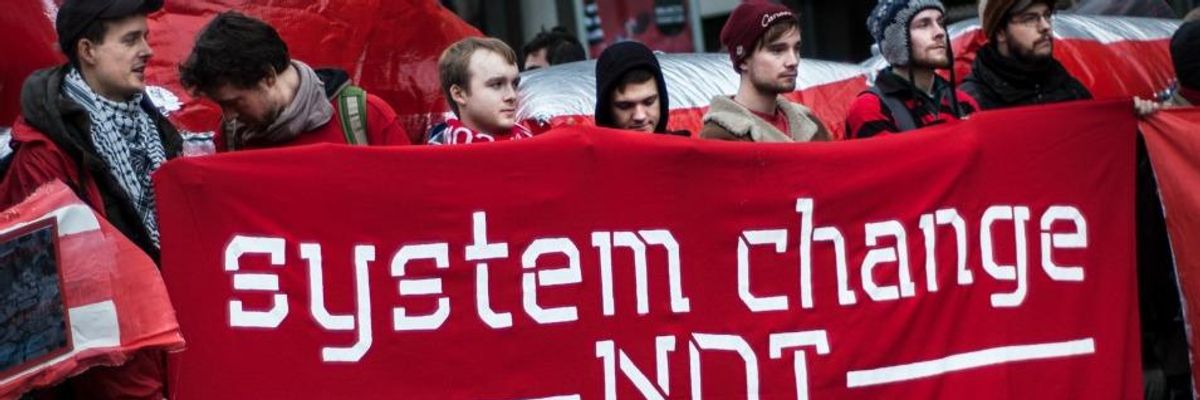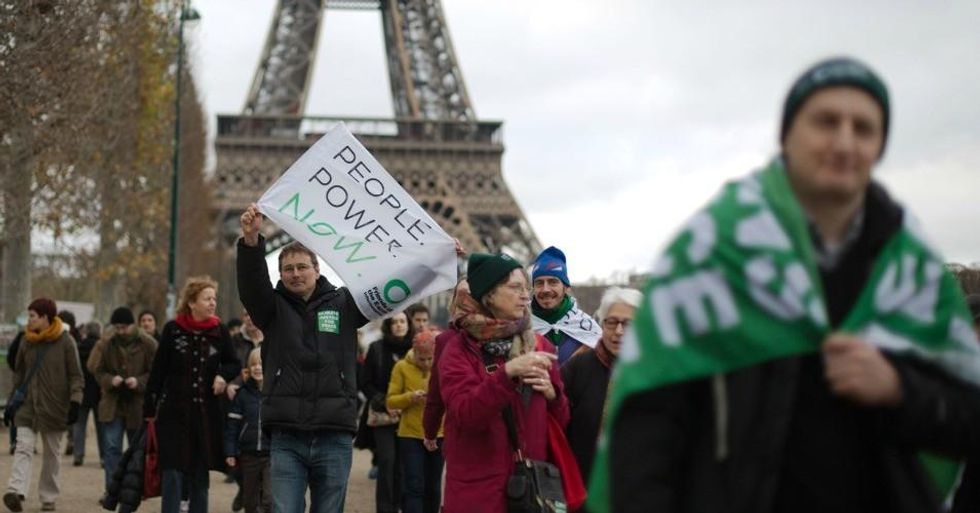PARIS, France - The most inspiring moment of December 12 was not the adoption of the United Nations Paris agreement but the sight of more than 20,000 people on the streets, building the power of the people, demanding climate justice and an end to dirty energy.
The Paris agreement was a diplomatic success but it will not stop the climate catastrophe; it is neither ambitious nor just. Many heads of state used the language of climate activists when they addressed the summit on November 30. They noted the extreme urgency of the crisis, their responsibility to future generations and the need for a just agreement.
"After more than twenty years of climate negotiations, developed countries demonstrated once again that they can talk the climate justice talk, but not walk the walk."
As soon as their speeches were over, the hollowness of the leaders' words became clear. Negotiations quickly showed the divide between developed and developing countries. Who will take on the burden of decarbonisation of their economies? Who is going to finance it? How will we support people affected by the impacts of climate change? After more than twenty years of climate negotiations, developed countries demonstrated once again that they can talk the climate justice talk, but not walk the walk.
In October 2015, a large group of civil society organizations analyzed the national voluntary pledges which states have submitted as their contribution to reduction of greenhouse gas (GHG) emissions. This analysis revealed that developed, richer countries are trying to shift the burden of responsibility onto developing countries.
Countries that have become wealthy by burning fossil fuels have taken up much more than their fair share of our limited carbon budget but are unwilling to do their fair share to deal with the climate crisis. They bear the legal, moral and political obligations to urgently make the deepest emissions cuts and completely transform their economies and societies.
For instance the USA presents itself as a climate hero, but its pledges add up to only 20% of its fair share. Some observers of the Paris process described the final text as having 'the USA's fingerprints all over it."
In June 2015, the 'People's Test on Climate' was developed by a large group of civil society organizations to evaluate the Paris agreement based on what science and justice require. [link to: ].
The People's Test identified four criteria for a success in Paris:
1. Catalyze immediate, urgent and drastic carbon emissions reductions;
2. Provide adequate support for transformation;
3. Deliver justice for impacted people;
4. Focus on genuine, effective action rather than false solutions.
Measured against these criteria the Paris agreement is a failure.
The Paris agreement is not ambitious enough in terms of temperature target or urgency, as it includes little action before 2020. The need for ambitious action by those most responsible is glossed over with weak promises of action in the future. Developed countries are shirking their historic responsibility and shifting the burden to developing countries. This is is not based on fair shares that take into account historical responsibility and capacity to act and hence it is not acceptable.
Furthermore, there is no obligation in the agreement to keep global warming under 1.5 degrees celsius, but only to 'pursue efforts' to do so. In any case, 1.5 degrees without requiring rich countries to do their fair share only places the extra burden on the poor.
The Paris agreement is incompatible with climate science. If the global economy isn't fully decarbonised by 2050, keeping temperatures below 1.5 degrees is out of the question - but the text alludes only to net zero or 'carbon neutrality' by the end of the century, if we can manage it.
The good news is that we can see real leadership and transformation taking place everywhere else.
"All around the world we see communities and individuals building the energy revolution that we need."
The voices outside the yearly UN climate summits are getting louder each year, as more people join the movement for climate justice. At almost the exact moment political leaders were praising themselves at the convention center, people were in the streets declaring a climate emergency.
All around the world we see communities and individuals building the energy revolution that we need. Our current energy system is unsustainable and fails to meet even the most basic needs of millions. Community-owned energy and local, sustainable food and farming gives us an opportunity to provide a dignified life for all.
Instead of embracing these grassroots alternatives, politicians have fallen under the spell of corporations pushing false solutions to climate change. The unproven technique of carbon capture and storage, the creation of rigged carbon markets--where the polluters make even greater profits--and industrial agriculture will all endanger communities and exacerbate the problems.
We could be on our way to climate-safe societies by now if politicians were not holding back people's solutions. In Paris we saw these solutions in food, energy, transport, housing and more at the Alternatiba--the village of alternatives. Politicians should get on board or get out of the way.
Now is the time to act. We need to continue to mobilize a broad movement for climate justice to resist dirty energy projects, to build and promote community-owned and democratically-controlled alternatives. We need to unite our struggles and keep the pressure on our governments to abandon fossil fuels subsidies and infrastructure development.
There are many campaigns to win in the next months and years as more and more people get involved in the struggle for climate justice. Join the struggle.

